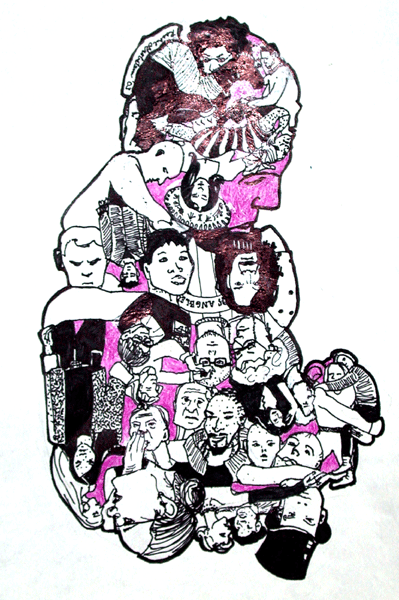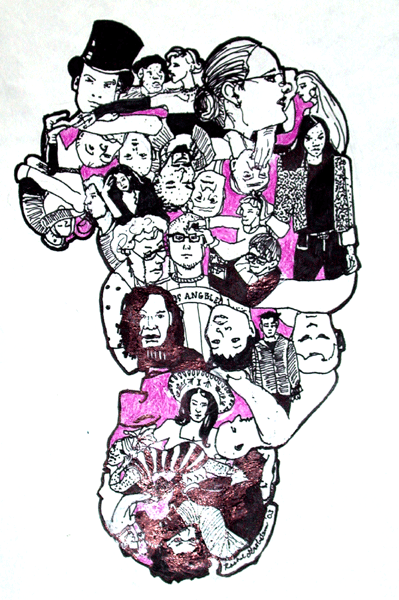Made available on Serendip
In association with Making Sense of Diversity: An Exploration, a world wide conversation

|
April 29, 2005
Allie Petonic (05), Christina Gubitosa (06) and Paula Arboleda (05)
Interactions Between Race and Class on Campus
Participants
Summary
Prepared by Anne Dalke
Additions, revisions, extensions are encouraged in the On-Line Forum
| 
|
With no intentions of "triggering class warfare," discussion opened with a series of stories about the "lack of class sensitivity" at Bryn Mawr. The "essential assumptions" of this school do not take into account a working class background; the "reality of where I came from" is not valued here. Prior education is taken as an index to class status (it is assumed that, lacking opportunity and access to AP classes or sports clubs, one comes to college "without understanding the fundamentals"). Lacking such shared experiences, it is difficult to bond with others; you are locked out of the conversation in ways that are not always obvious. There is a presumption that, because one lacks certain experiences, one is "deficient," and so has to over-compensate. Campus discussions usually "coalese around race." Every action is (over) analysed in terms of race; it is assumed that someone who is "visibly not white" comes from a lower class. Class issues are not attended to outside of race. We need always to be watching what we appear to be, as opposed to what we are. There is also a striking lack of connection to West Philadelphia: an assumption that a "certain class" lives here, that is unaware of what's going on outside. But just "getting on the R5" (as opposed to the 100) calls up race and class issues.
By coming to Bryn Mawr, we are bringing ourselves into a new class. How can we justify being here, to our friends and family @ home? Although people come to Bryn Mawr both "by limo and greyhound"--there are poor people here--some employers assume that anyone @ this "bougie school" will not be knowledgeable about class issues. College serves two (contrary? linked?) functions: it both maintains class distinctions and enables class mobility. Is our Bryn Mawr education reinforcing or unsettling established class differences? For an earlier generation of immigrants, class mobility was a positive virtue, and college was a way to accomplish it. For some of their children, the upper class associations of schools like Harvard or Bryn Mawr are undesirable; some of us do not want to participate in them. Is that a historical change?
It can be as much an embarrassment to be rich as it is to be poor: someone going to Harvard may prefer to say that they "go to school in the East," as someone in India may not want to say that she is "studying in the United States." A Posse student may say that she is "going to Bryn Mawr because of Posse," rather than that she is "going to Bryn Mawr because of me"--because of what she herself has done. Assumptions are made about "what kind of people" come from what neighborhoods: what class they are from, and what kinds of schools they attended, what sort of education they received there.
Such associations are "not ridiculous." Seventy percent of the students in upper-tier schools are from the upper class. It is presumed that they ("we") got here through hard work, and that those who aren't here aren't hard working. The importance of differences in social class is "not in our minds" at Bryn Mawr. Class differences are not recognized here (when the dining center hours were extended to accomodate athletes, for instance, they were not accomodating dining center workers, who had to cover the later shifts). For people of middle and lower class background, the experience of being told what to do by management is common, irritating, and profound; this is not recognized by the upper class, who do not realize that making decisions without consulting their workers exacerbates a class experience.
What are the college experiences, more generally, of students on work-study? Are class differences recognized elsewhere? What are the experiences of our friends in state schools? Merit aid has escalated incredibly around the country; a recent article in the Philadelphia Inquirer included a bar graph indicating that most aid is now given to families with incomes in the $100,000 range. It was suggested that "privilege" could be separated from how much money one has; some of us had privileged educations because our parents believed in class mobility--but find it hard to find the funds for us to stay here a full four years.
People in the working class can be very critical of middle-class values; they can have a Marxist understanding of middle-class people as "unconscious" and "blinded by consumption." But the "whole point of our coming here" is to "provide for me, and my future family." Can I put myself in a position of making more money without being labeled middle-class? Some of us resisted coming here, and resist the description of Bryn Mawr as "manufacturing young urban professionals." Is there a way to become college educated and still maintain my class roots? Are there ways to access new areas of experience, without losing consciousness of important background differences? Can I keep a sense of being attuned to the underprivileged? Can I "make it good," without being "criticized for moving on"? Can I find a way to have more money without adopting the set of values that come with it? Without taking on all the privileges of being "the man"?
Might we get rid of the terms "privileged" and "advantaged," in order to speak more bluntly about differences in money, opportunity and power? Can I move into a new class level, and still teach my children that "I'm not their checkbook"? Can they know that there is a baseline of support there, if something goes wrong, without "becoming different" because they have that security? But the amount of money you have really does make a difference in how you can live. Most people (in America? at Bryn Mawr?) have no idea how big the working class is, nor how "frigid our mobility." Rich people have "no concept of reality"; if they were poor, they could not survive. These "boxes work": there is a fundamental difference between trying to live on $100,000 and $35,000 a year (not to mention incomes below that figure). What's wrong w/ wanting more?
As time ran out, we had some trouble "bringing this home." Not every one in the lower classes want to become richer (though many people go to great lengths to appear richer than they are, and will give up doing things that benefit themselves to put on such a persona). Many desire to "go upwards" because of the stigma of poverty, not because they don't value being working class. It is not a deficiency that prevents us from being middle class; if we could find another way of presenting ourselves so it doesn't seem as if "something is wrong" if we stay in the working class, if the "shame of being poor" could be erased....
Can we learn to disassociate how we feel about ourselves from how others feel about us? Can we make distinctions between how much money we have and how we value one another?
The series of Friday afternoon conversations on "Making Sense of Diversity" will resume in the fall. Please contact Vanessa Christman in the Multicultural Office, Anne Dalke in the Feminist and Gender Studies Program, or Paul Grobstein in the Center for Science in Society if you have suggestions for topics or speakers. You are also warmly invited to post your ideas in the on-line forum.
| Return to Schedule for Friday Noon Conversations

| Bryn Mawr Conversations
| Archived
Forum
| Archive of Bryn Mawr Conversation
| General Conversation
| Serendip Home |
These pages are sponsored by the Bryn Mawr College Office
of Intercultural Affairs, the Center for Science and Society and the Serendip
website. Send us additional comments or suggestions at Serendip
© by Serendip 1994-
- Last Modified:
Wednesday, 21-June-2005 15:18:00 EST

